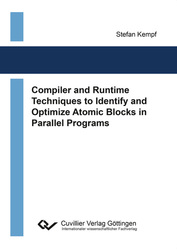| Departments | |
|---|---|
| Book Series (96) |
1381
|
| Nachhaltigkeit |
3
|
| Gesundheitswesen |
1
|
| Humanities |
2370
|
| Natural Sciences |
5408
|
| Mathematics | 229 |
| Informatics | 319 |
| Physics | 980 |
| Chemistry | 1364 |
| Geosciences | 131 |
| Human medicine | 243 |
| Stomatology | 10 |
| Veterinary medicine | 108 |
| Pharmacy | 147 |
| Biology | 835 |
| Biochemistry, molecular biology, gene technology | 121 |
| Biophysics | 25 |
| Domestic and nutritional science | 45 |
| Agricultural science | 1005 |
| Forest science | 201 |
| Horticultural science | 20 |
| Environmental research, ecology and landscape conservation | 148 |
| Engineering |
1795
|
| Common |
98
|
|
Leitlinien Unfallchirurgie
5. Auflage bestellen |
|
Advanced Search
Compiler and Runtime Techniques to Identify and Optimize Atomic Blocks in Parallel Programs (English shop)
Stefan Kempf (Author)Preview
Table of Contents, PDF (55 KB)
Extract, PDF (150 KB)
Atomic blocks are a programming language construct that marks sections of code that multiple threads may not execute concurrently. The implementation of the mutual exclusion is left to the compiler or the runtime system. To avoid race conditions however, developers are still responsible to detect all places in the code where atomic blocks are needed. It is of course also important that mutual exclusion is implemented efficiently.
This thesis therefore pursues two goals. First, we develop a data dependence analysis that identifies potential critical sections in a parallel program, presents them to the programmer, and then adds atomic blocks to the code. Second, we enhance existing techniques – software transactional memory (STM) and lock inference – to implement atomic blocks. Our approach combines the advantages of STM and lock inference, which allows atomic blocks to be implemented more efficiently.
The evaluation shows that our approach identifies atomic blocks that closely match those atomic blocks that an expert would add to the code. Compared to a pure STM or lock inference implementation, our combined approach to implement atomic blocks speeds up execution times by a factor between 1.1 and 6.3.
| ISBN-13 (Hard Copy) | 9783954048403 |
| ISBN-13 (eBook) | 9783736948402 |
| Final Book Format | A5 |
| Language | German |
| Page Number | 184 |
| Lamination of Cover | matt |
| Edition | 1. Aufl. |
| Publication Place | Göttingen |
| Place of Dissertation | Erlangen-Nürnberg |
| Publication Date | 2014-11-03 |
| General Categorization | Dissertation |
| Departments |
Informatics
|
| Keywords | Atomic Blocks, Multicore, Software Transactional Memory, Lock Inference |








